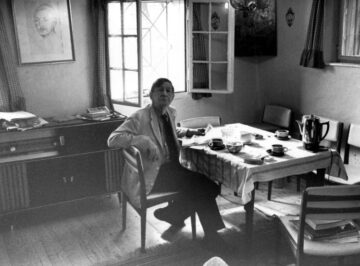Helen Rouner in Commonweal:
 Last summer, as I sat waiting for a train in Penn Station, I noticed a figure approaching and trying to get my attention. Keenly aware that I was patronizing an ostensibly public space where the only seats were placed behind gates monitored by security guards, I was eager to part with a few dollars if asked. It took me a moment to register that the woman standing before me, wearing a blue habit and a crucifix around her neck, was asking to borrow my cell phone. She needed to call her elderly father, she said, to tell him that her train would be late, and that she would seek shelter for the night at a convent she had heard of in Boston before continuing her journey. Flooded with a sense of the auspicious, I asked her what her destination was. She said she was heading—as I somehow had felt she would be—to her father’s house on Cape Cod. She named the same town where my in-laws live, to which I, too, was traveling. My husband Jack was picking me up in Providence to drive there, I told her. Would she like a ride?
Last summer, as I sat waiting for a train in Penn Station, I noticed a figure approaching and trying to get my attention. Keenly aware that I was patronizing an ostensibly public space where the only seats were placed behind gates monitored by security guards, I was eager to part with a few dollars if asked. It took me a moment to register that the woman standing before me, wearing a blue habit and a crucifix around her neck, was asking to borrow my cell phone. She needed to call her elderly father, she said, to tell him that her train would be late, and that she would seek shelter for the night at a convent she had heard of in Boston before continuing her journey. Flooded with a sense of the auspicious, I asked her what her destination was. She said she was heading—as I somehow had felt she would be—to her father’s house on Cape Cod. She named the same town where my in-laws live, to which I, too, was traveling. My husband Jack was picking me up in Providence to drive there, I told her. Would she like a ride?
At that moment, loudspeakers announced our train’s belated arrival, and we shuffled into line together. I noticed a thick volume under her arm, with deeply lined eyes gazing out at me from the cover. The nun—Sr. Maria, she introduced herself—was reading the collected poems of W. H. Auden. Auden was one of my favorite poets, I told her, an inheritor of the Romantic tradition that was my particular academic interest. Sr. Maria was a great reader of poetry, I learned, and had just completed a PhD in Catholicism and philosophy—precisely Jack’s field of study. Minutes after he had retrieved us from the Amtrak station in Providence, the two of them were debating Hegel on ritual. At the end of an hour’s drive, just before we delivered her to her father’s house, Sr. Maria asked me to read aloud from the Auden volume. “The Cave of Making” was her latest favorite, she said. I obliged, and the three of us sat in the car, sharing the sound of the poem.
More here.
